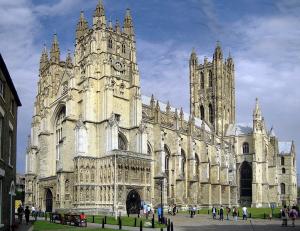 Post-Anglican Anglicanism – Part I
Post-Anglican Anglicanism – Part I
In my recent posts, I’ve been going through the main periods of Anglican history since the Reformation. Here’s the way I’ve divided things up:
Act I. 1533-1867 – Erastian Reformed Catholicism
Act II. 1867-1960s – Colonial Relationships; 4 Spiritualities
ActIII. 1960s-1998 (or 2003) – the Anglican Communion
Act IV. 1998 (or 2003) – present – Post-Anglican (or Postmodern) Anglicanism
I’ll conclude this historical overview with a discussion of what I’m calling Post-Anglican (or Postmodern) Anglicanism, which I date from either 1998 or 2003 to the present. 1998 is a suitable starting point because of the dramatic new attention given to the global aspect of Anglicanism as a result of Lambeth, especially the Global South and what I’ve called the Global Anglican Spirituality. This new attention on the global characteristic of Anglicanism as a result of Lambeth 1998 also produced a greater awareness of the ways in which Anglican churches at the global level should relate to one another.
2003 is also a good place to designate as the beginning of Post-Anglican Anglicanism because the consecration of Gene Robinson by The Episcopal Church precipitated the theological and ecclesiastical realignment that was, ultimately, inevitable.
Many of the things that Anglicanism is experiencing as a challenge to its identity is, I believe, a consequence of the forces of postmodernity that are threatening the identity of just about every entity imaginable, from individuals to families to churches to public institutions. Among these forces or trends, of which I would like to write much more in the future, are: suspicion of “metanarratives”; pluralism; disunity; choice and consumerism; constructed reality (existentialism); fragmentation; lack of clear identity and the co-existence of multiple identities; decentralization; a secondarily oral culture; networked existences and hypermedia; and homelessness and being lost in the cosmos.
My Ph.D. thesis was on the nature of orthodox Anglican identity. I had wanted to study the renewal of Anglicanism but ultimately realized that renewal is predicated upon a clear identity. The truth is, however, that Anglicanism is in the midst of a major identity crisis. I used to have a German friend who was always going around, running his hands through his red hair and mussing it up, lamenting loudly in his thick accent: “Ja, ja: I am in CRISIS!” That’s what a lot of us Anglicans are doing these days!
Problems of identity are ultimately problems of authority: if you have no authority to define things, then things get intolerably messy very quickly. Where there is no governing authority (which, by the way, doesn’t have to be tyrannical), diversity triumphs over unity. For this reason, since there is no consensus about what human nature is anymore, it’s no wonder that gender confusion abounds. We have all become existentialists, believing Sartre’s dictum that “existence precedes essence,” which means that there is no fixed human nature: we construct reality and the meaning of our lives. Authority, even without external compulsion, is conducive to unity. Where authority is weak, fragmentary, or contradictory, then diversity threatens to undo any coherent identity.
The Church universal is not immune to these things. Anglicanism has a huge problem with understanding authority, and therefore Anglicanism has a huge problem with diversity. It is liberal Anglicanism that has most notably pushed diversity to the point that being an Anglican is meaningless. If you can be an Anglican priest as well as a Wiccan priestess or Moslem or Buddhist, then “Anglican” is just another lifestyle choice with no substance.
The diversity of liberalism stems from its lack of any coherent authority. Theological liberalism begins by denying the authority of the Scriptures, and as a result an intolerable degree of diversity is tolerated.
But it turns out that the problem of diversity, which is really a problem of identity and authority, is systemic to the postmodern condition and is not the exclusive domain of liberals. For this reason, we orthodox Anglicans are also unsure of what it means to be Anglican.
I see I’m running out of space this time, so I’ll define the paradox of a “Post-Anglican Anglicanism” next time, as well as examining the degree of diversity found in orthodox Anglicanism.









